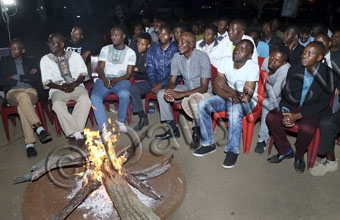Roving axe connects community
21 Feb 2019
Africans used to have their way of promoting peace, cohesion and good neighbourliness.
Some cultural trends were followed to promote and sustain good neighbourliness as well as peace among communities.
It could be the use of an axe, knife, spade or the setting up of kraals or bonfire.
For instance, in every traditional village structure there is always an axe in each homestead coupled with other assortment of household equipment or tools such as digging pick, cutting saw, spade, rake and wheel burrow among others but there could be uniqueness in the usage of the tools.
There is one particular most useful tool among them and is used almost daily, an axe which is used to chop wood for making fire for domestic cooking and brewing of alcohol, a common practice in some villages.
If one does not have an axe especially a family man, is branded unfit or unman enough to cut thorny bush trees to patch the kraal where gaping holes have been left by cattle.
Interestingly there is phenomenon about the usage of an axe in Bokalaka ward in Molepolole.
Most of the households have axes but residents choose to use one axe at a time from a particular homestead.
The roving axe is used interchangeably until its handle gets broken or its blade needs to be sharpened.
Early in the morning, whether it is raining or unbearably windy as Molepolole is prone to those mad winds mainly in the months of August and September, if an elder or a father wants to chop wood he would send a child to collect the axe from a certain household notwithstanding the fact that he has his at disposal.
This is a tradition or a subculture that is now entrenched within Bokalaka ward people. While the child runs to collect the axe, the father would be busy choosing which woods to chop from a pile of woods usually bundled in the back corner of the yard.
This practice nonetheless continues to baffle many while residents of the ward find nothing amusing about the practice.
This according to Mr Shima Seboko, an auto mechanic who spent most of his time there, the roving axe interconnects them communally.
“You see this is a different axe we are currently using because the other one which has been in use its handle had broken”, he said as he handed the axe to a young boy who had come to borrow it.
This rare practice of using one axe in the ward has been there for years now and it said has been used to increase cohesion, cooperation and social harmony within the Bokalaka people, and it has undoubtedly done that. One borrows the axe not that he/she does not have one but because it is the one in circulation for an unspecified period.
This social epic scenario is reflected in two passages of Things Fall Apart novel of a Nigeria distinguished author Chinua Achebe, where tribesmen of Umofia noted that when kinsmen gather under the moon at a central place it is not because there is no moon in their homestead, it is strengthening the kinship among them.
Another man in Umunna, where Okonkwo the main character was banished, conveniently during a feast of food and abundant palm wine prepared by Okonkwo to thank them for having taken good care of him during his seven years stay there shared the same sentiments.
He said “a man who calls his kinsman to a feast does not do so to save them from starving.
They all have food in their own homes.
When we gather together in the moonlit village ground it is not because of the moon.
Every man can see it in his own compound. We come together because it is good for kinsmen to do so”.
In the meantime, during the past festive season Seboko’s axe was the one in circulation.
People frequently borrowed as many homesteads in the ward had slaughtered goats and needed to chop and cut desired portions of the meat.
According to legends, Bokalaka ward in Molepolole acquired its name from a heated engagement between four foreign traditional doctors who had come to Molepolole and were summoned by the village chief at the main kgotla soliciting their well sort after services.
However it turned out that both Bakwena Kgosi and the doctors could not understand each other because of language barrier.
When the Kgosi could not get what he wanted he allegedly retorted that “these Kalangas can’t comprehend what I am saying” and immediately dismissed them.
The four doctors left and ultimately settled near present day Bokalaka ward where some of them inter-married with Bakwena, hence Bokalaka ward though the inhabitants there have no direct or indirect blood relation with Bakalaka.
The roving Bokalaka axe has indeed cemented the spirit of good neighbourliness, cohesion and unity among the Bokalaka people. Ends
Source : BOPA
Author : Benjamin Shapi
Location : GABORONE
Event : Interview
Date : 21 Feb 2019







